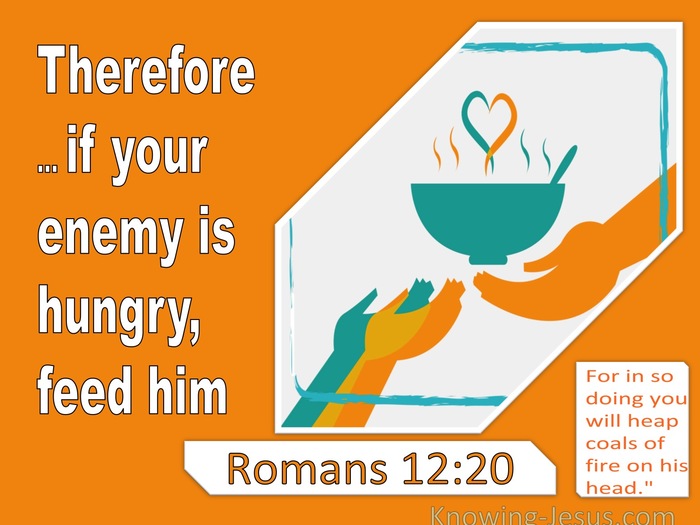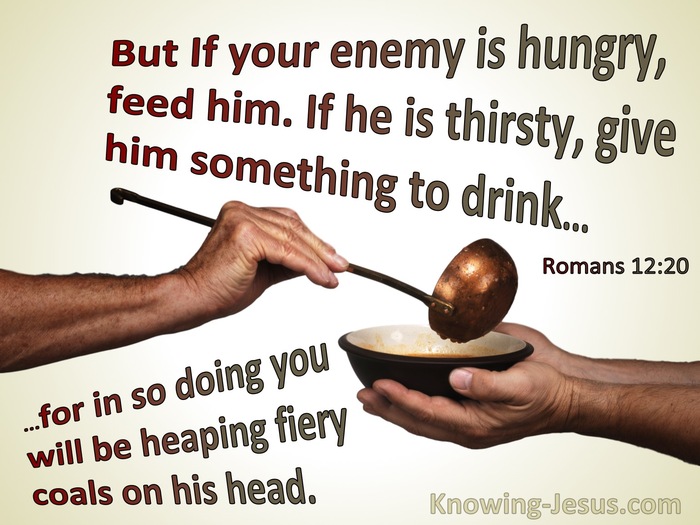◄ What Does Romans 12:20 Mean? ►
But If your enemy is hungry, feed him. If he is thirsty, give him something to drink. For in so doing you will be heaping fiery coals on his head.
Romans 12:20(HCSB)
Verse of the Day
Christ's Sermon on the Mount is considered by many as a series of moral teachings by which we should all try to abide. The clarion call of the world today, is to stand up for your rights, even at the expense of others. And the world often portrays the Lord Jesus as a bit of a push-over with His teachings on being meek and mild-mannered, loving your enemies, blessing those who curse you, and praying for those that despitefully use you.
As Christians, it is only right and proper to show an enemy kindness and consideration. Indeed, the prayers of a righteous man offered on behalf of his enemies, can produce some effective results. Giving positive good for negativity and evil, is a principle that is not new. This is a concept that is found throughout Scripture and is taught in each dispensation. In this verse, Paul is quoting from Proverbs 25: "If your enemy is hungry, give him food to eat. If he is thirsty, give him water to drink."
This verse in Romans gives a glimpse into the other side of the coin that graciously feeds an enemy when he is hungry and provides drink for him when he is thirsty: "For in so doing," we read "you will be heaping fiery coals on his head." Scripture reveals that returning good for evil and showing kindness to an antagonist, may result in one's adversary feeling guilty for his unkindness and may cause him to admit his fault.
Paul describes this counter-measure as: "Heaping burning coals on his head." The outcome of combatting evil acts and wickedness with goodness, can often cause those that oppose us to burn with shame, and can even result in bringing them to repentance and ultimate forgiveness.
Nevertheless, there are times when countering evil with good can embolden an enemy to commit even greater atrocities against a person they hate. Similarly, it should be noted that when evil is countered with good from bitterness of heart or a resentful spirit, it is counter-productive. Good deeds done from an impure motive, with an 'I'll show them' attitude, carried out reluctantly because it is the 'proper thing to do', or to elevate one's popularity in the eyes of others while concealing bitterness within, is not what this verse is teaching.
Although returning good for evil can certainly have a positive effect on an adversary, the significance of "heaping fiery coals on his head," has a much greater depth of meaning for those who are God's people, for this verse follows another Old Testament quote, which warns: "Never take your own revenge, but leave room for the wrath of God, for it is written, 'Vengeance is Mine'. I will repay', says the Lord."
We are clearly told that vengeance on an enemy is not our remit. Vengeance of evil belongs to God, and we must never take from the Lord what is rightfully His. Vengeance is the sacred premise of God, and a day is coming when He will judge the world, and all the evil acts perpetrated on His people, in righteousness.
There is a day of reckoning for all sinners which remains under God's righteous jurisdiction alone. As believers, we have been given specific instructions to follow when dealing with our enemies: "If your enemy is hungry, feed him. If he is thirsty, give him something to drink. For in so doing you will heap fiery coals on his head." There is nothing more remarkable to a sinner, entangled in sin, than a godly man or woman graciously repaying good for evil and offering kindness in response to all manner of evil.
It is not God's will that anyone should perish, including our bitter enemies. It is God's desire that all come to repentance and trust in Him for the forgiveness of sin, and if we honour His will by reacting to acts of evil with deeds of kindness, maybe it will help to bring a sinner to repentance and give glory to God.
It is not always easy to repay evil with good, but His grace is sufficient to enable us to love our enemies and to do good to those that despitefully use us; to feed a hungry enemy and provide him with a drink when thirsty. When we obey His Word there is rejoicing in heaven, especially if a sinner is brought to repentance. But a day is coming when God Himself will avenge His people, and on that day burning coal and the fiery judgement of the Lord will rain down on every unrepentant evildoer.
The mercy and grace of God is available to all, and as His children, we should demonstrate that same mercy and grace to the lost, including our enemies. God's goodness and grace, His kindness, His forgiveness, and His long-suffering mercy, was available to you and me when we were sinners, and we should respond with the same kindness, forgiveness, long-suffering mercy, and godly grace.
The responsibility of our enemies is to come to repentance while our responsibility is to obey God's Word: "If your enemy is hungry, feed him. If he is thirsty, give him something to drink," and to do it in love.
My Prayer
Heavenly Father, there are times when I have been hurt and abused by my enemies who have sought to harm me and those I love. I confess, Lord, that at times I would like to pay them back for the wrongs they have done. But I know I have been called to do good to those that treat me badly, to pray for my enemies, and to feed them when they are hungry, for Your greater glory. I also know that You have promised to avenge those that hate me, and I thank You that a day is coming when You will put all wrongs to right. Keep me from trying to avenge any wrongs done to me, when Your Word clearly says: "Vengeance is Mine, says the Lord, I will repay." Draw me closer to Yourself, and may the words of my mouth and the actions I do, bring honour to Your holy name and blessings to those with whom I come in contact. This I ask in Jesus' name, AMEN.
Choose a Verse from Romans 12
Romans 12:20 Further Study
- Romans 12:20 in the Parallel Bible
- Romans 12:20 in the Thematic Bible
- Romans 12:20 Cross References
- Romans 12:20 Treasury of Scripture Knowing
- Romans 12:20 Sermons
- Romans 12:20 Prayers
- Romans 12:20 Images
- Romans 12:20 Devotionals
- Choose Chapter
Never miss a post















